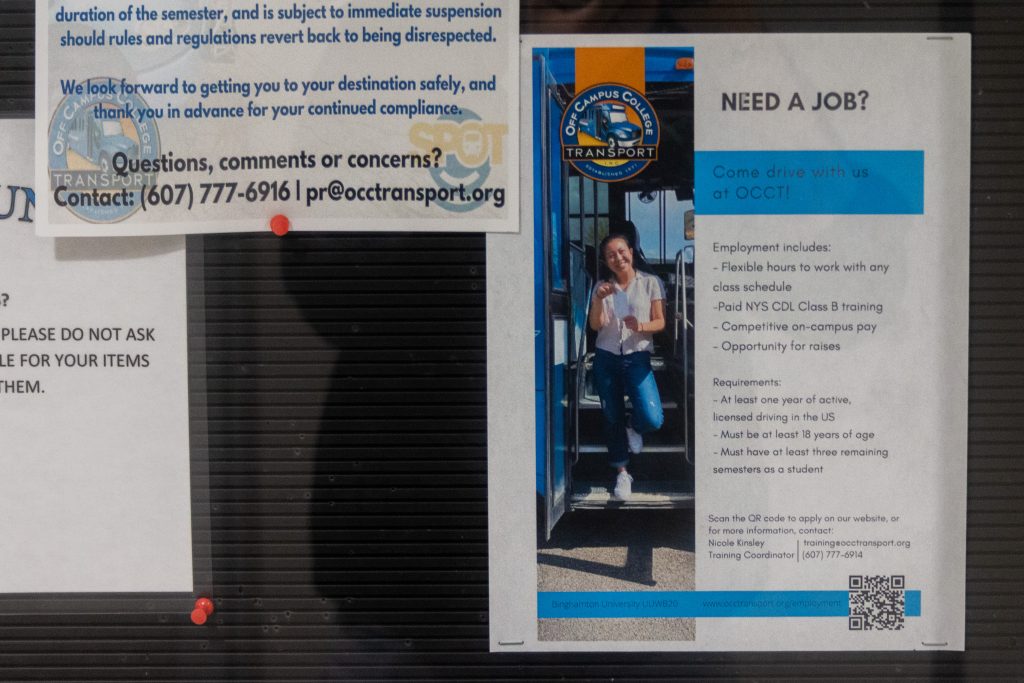Binghamton University’s student-operated blue bus service has been hit by COVID-19-related staffing issues.
Off Campus College Transport (OCCT) provides service within campus via the campus shuttle, as well as routes for commuters that travel to and from the campus community area. For the spring semester, OCCT has been forced to run at reduced capacity due to lack of available staff to run its fleet of buses. According to Jake Abrams, public relations coordinator of OCCT, green campus shuttles now end at 10 p.m. instead of 12:30 a.m., and two campus shuttle loops have been added to blue bus schedules as a result.
“In an effort to maximize operational efficiency, we’ve reduced service by 10 percent for the spring 2022 semester,” Abrams wrote in an email. “We did this by removing the runs least in demand, while keeping the ones that saw the highest demand.”
Abrams said he believes the problem could be a result of carryover effects from the previous academic year.
“As with the rest of the public transit industry, (along with the entire global labor shortage), [OCCT] has been experiencing significant staffing shortages since the start of the COVID-19 pandemic,” Abrams wrote. “These shortages can be traced back to the middle of 2020, where a large graduating class of our student drivers met a lack of training classes of new drivers, given the (at the time) restrictions on in-person interactions. These factors, when supplemented with the return to in-person classes and lack of demand to work in public transit given the increased risk and exposure to [COVID-19], has left us with far more demand for transit than supply of drivers to provide.”
Throughout the United States, and particularly since the emergence of the Omicron variant, staffing issues have become a major problem, particularly in the transportation industry. The nation’s largest public transportation systems in New York, San Francisco and Washington, D.C. have all cut back on service, and in some cases, closed down entire transit routes for extended periods of time.
Student Association (SA) President David Hatami, a senior double-majoring in political science and business administration, serves as the CEO of OCCT. Hatami said he believes that OCCT’s staffing problem will be resolved quickly.
“Despite our current situation, I am confident that our issues are short-term in nature, and that student interest in becoming drivers will steadily increase as the pandemic becomes less of a public issue,” Hatami wrote in an email. “As of now, the SA is spearheading an effort to increase student awareness regarding OCCT-related opportunities and will continue recruiting efforts far into the spring semester.”
OCCT is currently accepting applications on a rolling basis and offers benefits such as starting pay of $13.80 an hour, a free commercial driver’s license training course and flexible hours that can be built around a student’s schedule.
Taylor Lipton, a junior majoring in business administration, has been driving for OCCT since his freshman year and said he had a more positive outlook on the state of OCCT.
“The scheduling has changed slightly this semester, but I think in large part it was because we had so many empty runs in previous semesters,” Lipton wrote via email. “I would say if anything, it’s just become more efficient. I’ve always felt that with this job, we get to work as much or as little as we want, and this semester doesn’t feel any different. In fact, I’m working close to the most amount of hours per week than I’ve ever had right now.”
With over half of all students at the University living in off-campus housing, students often need OCCT to get to and from campus. Matthew Kennedy, a junior majoring in Asian and Asian American studies, lives off campus in the West Side Binghamton area. He described the importance of the buses for himself and fellow students that regularly use OCCT.
“The bus is important to my daily schedule and allows me to get to and from campus,” Kennedy wrote. “I rely on OCCT because Broome County [Transit] buses don’t run nearly as well at less busy times, when I tend to have class. Even those that do [have cars] still rely on the buses to some extent because parking on campus is tight, and sometimes it’s easier to take the bus around town.”
Kennedy said he has noticed some delay in arrival times this semester.
“Sometimes I am waiting 15-20 [minutes] after class, and the schedules can be off,” Kennedy wrote. “The [ETA] SPOT app is never really that accurate but usually holds true in a range of five-[10 minutes] for on-campus buses.”
Students looking to apply to become drivers can visit occtransport.org/employment or contact Andrei Lopez-Bondarchuk, OCCT training coordinator, at (607) 777-6914.



